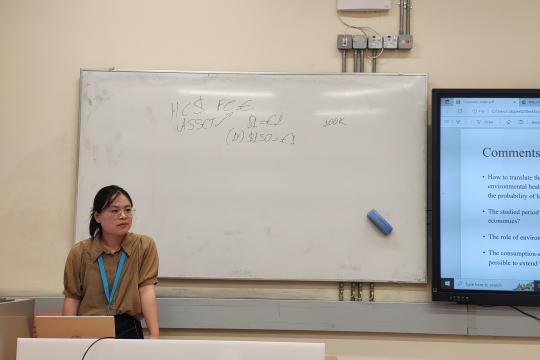Meet Fan Xia, EfD China researcher, and WinEED member! Currently, she has a postdoc position at Nanjing University. Next year in January, she will start a new position as Assistant Professor at the Environmental Health Department at the same university to start her tenure track. We talked with her about her career, her plans, and her advice for young researchers.
How did you become a researcher?
I didn’t expect to be a scholar. However, during my third year of undergraduate studies in environmental science, I took a class in environmental economics, which was taught by Jintao Xu, EfD China researcher. Since then, I have found it very interesting how much you can explain from the perspective of costs and benefits. For example, I realized that the solution to many environmental issues lies not only in technology but also in institutions and policies. There may be many technologies available, and firms could invest in them, however, they could decide not to invest to save costs. If so, these are not technological but economic problems.
After getting the bachelor's degree, I started my training in economics more rigorously at the National School of Development at Peking University, and I received my Ph.D. degree. I think that the process of getting the data, learning the literature, analyzing, writing, and presenting the results is very exciting.
What are your research interests? What have you researched so far?
Currently, I have two research trends. One is environmental health and the other is environmental regulation analysis. During my Ph.D. studies, I worked on the first trend. I examined the health effects of air pollution episodes in China. In this country, there have been air pollution episodes that have lasted multiple days. I studied how the duration of pollution influenced people’s decisions on medical expenditures. I found that if you don’t consider the duration of the pollution events, you can underestimate the costs that people encounter in medical attention. Another aspect of this study is that not only you do have to consider pollution in particular matter (PM2.5) but also ozone pollution. You can’t omit the presence of ozone if you are interested in measuring the health costs of air pollution.
My second research interest is environmental regulation analysis. Using real-time emission data, I have studied how increasing the environmental tax for firms makes them diminish water pollution. I’m also interested in command-and-control regulations. For example, in Beijing, a policy for better air quality implies stricter emission standards. These higher standards can make some firms that pollute more move to other places with less regulation. As a result, air quality in Beijing can improve, but it can worsen in those cities or areas with less regulation.
Recently I have been interested in forestry to tackle not only climate change but also air pollution. Trees can bring the benefit of cooling cities and diminishing the impacts of global warming, however, allergies due to tree pollen can increase health expenditures. For this topic, I’m comparing the benefits of trees with the costs of health expenditures. Air quality has improved, but pollen exposure has increased and offsets some of the benefits.
What are your future career plans and career challenges?
The biggest challenge that I have now is to have a clear research career path. In the past, I may have had two or three small research questions to have a Ph.D. thesis, but now I need a bigger picture for the next decades. That means that I need to define the topic and the field I want to study. For this, I do not only need to know the frontiers of research, but also what kind of resources I need to conduct this research and promote it. I will have to grow more on my own.
Any advice for young researchers?
My advice for young researchers is that you should realize that it is difficult to pursue an academic career. Publication is very torturous, but if you still like doing research and writing down your findings, then don’t hesitate. Academia is a very nice career choice. When facing all kinds of challenges and difficulties at work it is important to get support from your colleagues, advisors, and family. Applying for a Ph.D. program is also not easy. There you will have solid training and hard qualifications and examinations, and to defend your thesis requires a bunch of training processes. Talk to your classmates, advisors, and friends to find solutions.
It is also important to have access to academic networks such as EfD. I thank my advisor Jintau Xu for introducing me to this network. At EfD I can find not only resources for research but also the chance to know people who do similar things to what I do, also, at EfD I can find potential coauthors from whom I can get inspiration and constructive feedback.
One aim of the collaborative program WinEED (Women in Environmental Economics for Development) is to provide support and resources to women economists in the EfD network. Thanks to the EfD research fund, projects that include women researchers can receive resources, making them advance in their careers and taking on research leadership. Fan Xia, together with Yuanyuan Yi and Ruozi Song are doing a research project financed by EfD. Its title is: Does one size fit all? An examination of China's environmental regulation and firm heterogeneity in cement industry.
Learn more about this study in a coming news article to be published in the EfD website!
By: Manuela Fonseca (comm officer WinEED - EfD Colombia)
